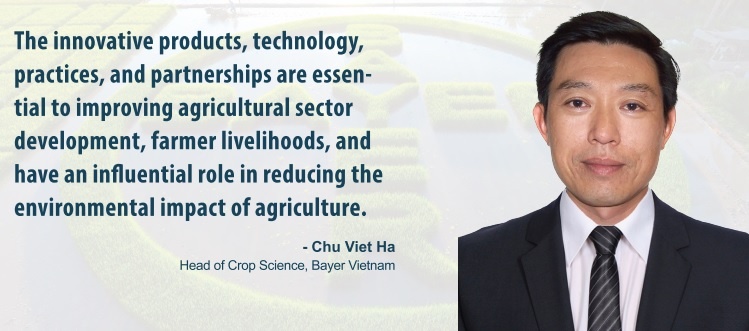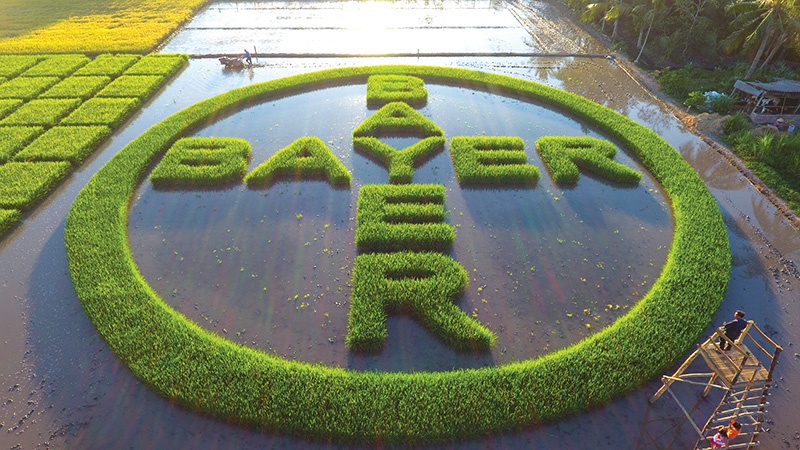Bayer promoting sustainable Vietnam healthcare and agriculture
Sustainability is central to Bayer’s group strategy and an integral part of their company’s business strategies. The company’s innovations, products and services enable it to contribute significantly towards meeting the Sustainable Development Goals set by the United Nations.
Both innovation and sustainability are crucial to achieving Bayer’s vision: “Health for all, hunger for none”. Since the COVID-19 outbreaks emerged, Bayer has accelerated this vision more and more. Although the goal will not be achieved overnight, it sets the foundation for Bayer’s future and serves as the mark by which it can measure all activity across the company.
In particular, with scientific expertise and innovative strength, Bayer is convinced that it can make a significant contribution to address the global challenges of food security and health.
 |
Variety of efforts
As Vietnam deals with the pandemic, Bayer has been working hard to bring the vision to bear in the country. Vietnam, like elsewhere in the world, is experiencing a concerning pandemic wave. Elective surgeries have been placed on hold, while demand for COVID-19 treatment has skyrocketed.
Thus, it is easy to lose sight of maintaining treatment of patients with other issues – such as cancer, diabetes, and stroke – during the pandemic. The problems are worsening as hospitals are working at their limits to treat an overflow of COVID-19 patients, thereby delaying the treatment of other diseases. In May the company, in collaboration with the Vietnam Administration of Medical Services launched a digital multi-platform to raise public awareness of stroke prevention.
The digital platform comprises a website, fanpage, and YouTube channels which focus on providing information about stroke prevention to patients and the general public. Moreover, COVID-19 is also posing an urgent threat to women’s health and empowerment by limiting access to family planning and also healthcare services.
To help address this challenge, Bayer has been supporting Vietnam’s family-planning programmes for years. The company has joined forces with the General Office for Population and Family Planning to implement the first phase of the Family Planning Communication Programme for Public Health initiative. Following the success of the first phase, a five-year plan was agreed for the second phase of the programme, from 2021 to 2025.
Besides raising health awareness for the community, Bayer also focuses on taking care of the health of its consumers through a variety of self-care activities. In April, Bayer launched a campaign on Facebook to encourage consumers and the community to enhance their self-care routines by pairing their daily dishes with Redoxon Triple Action, which helps to strengthen their immune system and reinforce their health in the new normal.
More importantly, Bayer has also recognised that healthcare personnel should also have the means to take care of themselves while working tirelessly for the common benefit of the community. In June, in collaboration with the Ho Chi Minh City Women’s Charity Association, Bayer provided 8,000 self-care products to the Ho Chi Minh City Center for Disease Control via the Vietnamese Fatherland Front in the city to aid frontline healthcare professionals.
The care packages include skincare products and multivitamin effervescent tablets that can help take care of frontliners’ skin when constantly wearing personal protective equipment as well as to keep them energised mentally and physically.
 |
| Bayer promoting sustainable Vietnam healthcare and agriculture |
Commitment to principles
In agriculture, Bayer is converting research and development into solutions for farmers that enhance productivity, create new value, and reduce the use of inputs necessary to produce a crop.
Thanks to the leading positions across technology platforms, Bayer is best positioned to discover, combine, and tailor solutions – serving unmet needs and imagining new ways to farm – and that’s a win for farmers, consumers, and the planet.
“As a world-leading agriculture company, Bayer has the global mission to set a standard for sustainability. With our innovation technologies, we would like to contribute to making agriculture or farming itself become much more professional and even more attractive to the younger generation,” said Chu Viet Ha, head of Crop Science at Bayer Vietnam.
“With our continual efforts and lots of new technologies available now, we believe that we can really help to support generational changes in agriculture to sustain a more sustainable food supply chain.”
At the Vietnam Agriculture Digital Transformation International Forum 2021, Bayer shared the company’s commitment to the principles of sustainable development of agriculture in Vietnam. In the face of many challenges, it is important for the agricultural sector to accelerate the digital transformation process to sail through the tough time. With the hope of supporting farmers in Vietnam overcoming difficulties caused by climate change and COVID-19 as well as driving the development of sustainable agricultural practices, Bayer Vietnam has been implementing a number of digital projects.
One, called myAgrolink, is a unique online application in Vietnam that connects farmers with reputable agricultural service providers. If a farmer faces a problem in their field, they can reach out directly to technical experts through these mobile apps to quickly get the answers they need, regardless of distance.
Meanwhile, the Airfarm application supports Vietnamese farmers to connect with reputable spraying service providers in their province and arrange a spraying schedule. It not only helps farmers to ensure the quality of the order, but also offers a channel for farmers to give or receive feedback and solve related problems after spraying.
According to the General Statistics Office, more than 32.1 million people aged 15 and over have been negatively impacted by COVID-19. Those affected include people who have lost their jobs, taken time off work or are working less hours, resulting in significant income losses. And farmers make up a sizable share of them.
In collaboration with Grow Asia, the National Agriculture Extension Center, and the International Cooperation Department under the Ministry of Agriculture and Rural Development, Bayer helped implement the “Better Farm, Better Lives” project in Vietnam last year. The project provided assistance for 80,000 farmers in the southeast and Mekong Delta provinces through supporting starter kit, care packages, along with a series of training sessions to help farmers advance their methods and increase productivity.
Along with immediate support, in the medium-term and long-term, the programme also provided smallholder farmers with education related to Good Agricultural Practices and modern agricultural technologies, by conducting a series of Train-the-Trainer and Train-the-Farmer sessions, including eight classes for extension trainers and 248 classes for farmers, with the support of local networks.
The virtual training was delivered to more than 63,000 farmers and physical training reached nearly 17,000 farmers to improve them with capacity-building through the use of modern agricultural technologies. The project has bolstered the spread of sustainable farming practices and ensured agricultural practices continue to meet international standards, as well as pushed forward the digitisation process of Bayer in operation.
As a result, farming production has been maintained during the pandemic and is continuing to develop. Smallholder farmers whose livelihoods and welfare have already been severely impacted are enjoying better lives. These activities have provided solutions to help farmers ensure a healthy and productive harvest in the face of drought and pandemic pressures, contributing to the journey of developing the agricultural landscape. In this activity, Bayer has almost met the target of half of the beneficiaries being women.
As the largest innovative agricultural input company in the world, Bayer is committed to the principles of sustainable development. Bayer is mindful that more needs to be done to help the resilience of Vietnam’s farmers and food system following pandemic disruptions, Ha said.
“The innovative products, technology, practices, and partnerships are essential to improving agricultural sector development, farmer livelihoods, and have an influential role in reducing the environmental impact of agriculture,” Ha added.
“We will keep going and innovating beyond the pandemic, because we have an obligation to those on the frontline and behind the scenes who have kept us going – the farmers, healthcare professionals, and the everyday heroes of our communities.”
| Bringing science education to younger generations Apart from its business and investment in Vietnam, Bayer is committed to the principles of sustainable development as a socially and ethically responsible corporate citizen. The company supports the local community to improve health and living conditions as well as creating a platform for young children to learn science as a key foundation for development. Bayer Vietnam, in collaboration with the Oxford University Clinical Research Unit in Vietnam, will launch the Science Digital Hub in the fourth quarter of 2021. Under a programme called Making Science Make Sense in Vietnam, launched in 2018, Digital Hub aims to provide schoolchildren with academic and practical knowledge and eventually contribute to the development of science education in Vietnam. The programme takes advantage of YouTube to give youngsters access to science education. Digital Hub hosts a collection of science videos and podcasts about health, nutrition, and the environment with learning levels equivalent to those on the national curriculum. All school students aged 11–17 will have the opportunity to gain science and critical thinking skills through a variety of fascinating experiments. |
What the stars mean:
★ Poor ★ ★ Promising ★★★ Good ★★★★ Very good ★★★★★ Exceptional
Related Contents
Latest News
More News
- Kurz Vietnam expands Gia Lai factory (February 27, 2026 | 16:37)
- SK Innovation-led consortium wins $2.3 billion LNG project in Nghe An (February 25, 2026 | 07:56)
- THACO opens $70 million manufacturing complex in Danang (February 25, 2026 | 07:54)
- Phu Quoc International Airport expansion approved to meet rising demand (February 24, 2026 | 10:00)
- Bac Giang International Logistics Centre faces land clearance barrier (February 24, 2026 | 08:00)
- Bright prospects abound in European investment (February 19, 2026 | 20:27)
- Internal strengths attest to commitment to progress (February 19, 2026 | 20:13)
- Vietnam, New Zealand seek level-up in ties (February 19, 2026 | 18:06)
- Untapped potential in relations with Indonesia (February 19, 2026 | 17:56)
- German strengths match Vietnamese aspirations (February 19, 2026 | 17:40)

 Tag:
Tag:



















 Mobile Version
Mobile Version